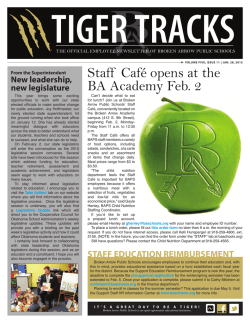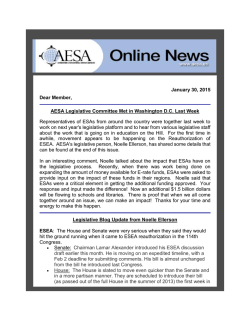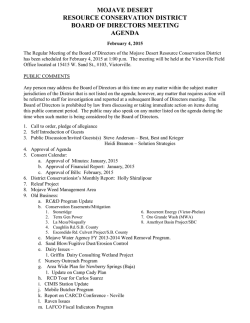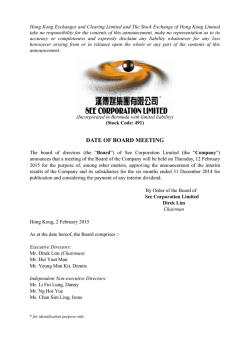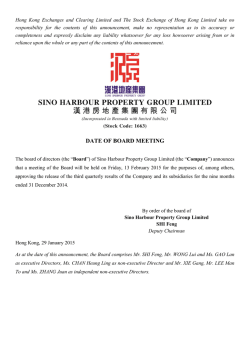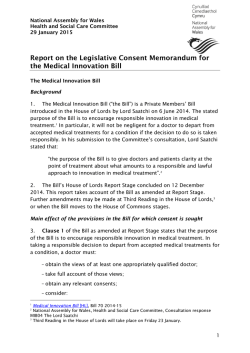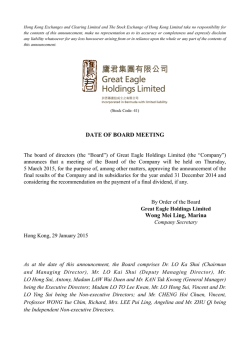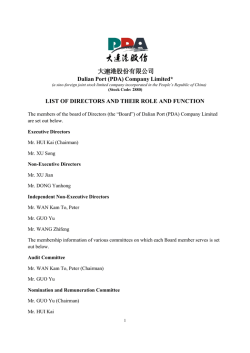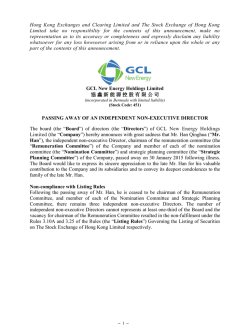
January 28, 2015 - Agenda - County Engineers Association of
CEAC Board of Directors 9:30am, Wednesday, January 28, 2015 CSAC Conference Call Line (916) 445-5476 9:30 am 1. Call to Order (Penrose) 2. Approval of Minutes, November 21, 2014 (Secretary) - Attachment One 3. Correspondence (Penrose) 4. CLODS Report (CLODS) 5. NACE Report (DeChellis) 6. CSAC Report (CSAC Staff) 7. Regional Directors Reports 8. Treasurers Report (Crump) 9. Committee Reports a) Flood Control and Water Resources b) Resource Recovery and Waste Management c) Surveyor d) Land Use e) Transportation f) Oversight and Special Tasks Committee Action Item: Approval of CEAC’s 2015-2016 Legislative Priorities and Guidelines (Keene/Buss/Martinson) – Attachments Two and Three 10. Other Committee Reports a) Fellowship b) Scholarship (Kowalewski) c) Outside Committees (HBP, CUCCAC, CCSFCC, SHSIP, TRCC, CTCDC, FLAP, TDAWG) 11. Life Membership 12. Unfinished Business a) Proposed General Services Committee (Mattson) b) CEAC Bylaws (Mattson) c) Washington D.C. trip for MAP 21 Reauthorization (Buss) 13. New Business a) CEAC Board of Directors 9:30am, Wednesday, January 28, 2015 CSAC Conference Call Line (916) 445-5476 14. 15. 10:00am Scheduled Conferences a) CEAC Spring Conference/League PWOI, Newport Beach, Orange County, March 25-27, 2015 b) NACE Annual Conference, Daytona Beach, Florida, April 19-23, 2015 c) Public Works Secretarial Seminar (PWSS), Mendocino/Lake Counties, May 27-29, 2015 d) CEAC 10th Policy Conference, Sacramento, Sacramento County, September 16-17, 2015 e) CSAC 121st Annual Meeting, Monterey, Monterey County, December 1-4, 2015 CEAC Board of Directors Meeting Schedule a) March 27, 2015, 11:30am (Spring Conference) b) September 17, 2015, TBD (Policy Conference) c) December 4, 2015, 11:00am (Annual Meeting) Adjourn Meeting Roster Officer Michael Penrose Matt Machado John Presleigh Scott McGolpin Mike Crump Mehdi Madjd-Sadjadi Doug Wilson Ken Miller Patrick DeChellis Dave Gravenkamp Office President President-Elect Secretary Past President Treasurer Treasurer-Emeritus Parliamentarian Newsletter Editor NACE Representative Historian County Sacramento Stanislaus Santa Cruz Santa Barbara Butte Marin (Retired) Tulare (Retired) San Bernardino (Retired) Los Angeles Siskiyou County (Retired) Regional Directors Steven Kowalewski Scott DeLeon Panos Kokkas David Leamon John Presleigh Vincent Gin Region Bay Area Northern California Sacramento Mother Lode San Joaquin Valley Central Coast Southern California County Contra Costa Lake Yolo Stanislaus Santa Cruz Orange CEAC Board of Directors 9:30am, Wednesday, January 28, 2015 CSAC Conference Call Line (916) 445-5476 Committee Chairs Susan Klassen Pattie McNamee Chris Stone Brian Balbas Jim Porter Steven Kowalewski Pat Proano Steven Steinhoff CSAC/CEAC Staff DeAnn Baker Karen Keene Kiana Buss Cara Martinson Chris Lee Merrin Gerety Committee Transportation Fellowship Flood Control/Water Resources Land Use Oversight Scholarship Resource Recovery & Waste Mgmt. Survey County Sonoma Contra Costa (Retired) Los Angeles Contra Costa San Mateo Contra Costa Los Angeles Title Legislative Director Senior Legislative Representative Legislative Representative Legislative Representative Legislative Analyst CEAC Program Manager Agency/County CSAC CSAC Los Angeles CSAC CSAC CSAC CSAC/CEAC ATTACHMENTS Attachment One ......................................November 21, 2014 Board of Directors Meeting Minutes Attachment Two .....................................CEAC 2015-2016 Legislative Priorities (DRAFT) Attachment Three ..................................CEAC 2015-2016 Legislative Guidelines (DRAFT) Attachment One November 21, 2014 Board of Directors Meeting Minutes CEAC Board of Directors Meeting 120th Annual Meeting Friday, November 21, 2014 ~ 11:00 a.m. – 12:30 p.m. Disneyland Hotel, Adventure Room (Adventure Tower) 1150 West Magic Way Anaheim, Orange County 1. Call to Order (Penrose) Meeting was called to order at 11:03 a.m. on November 21, 2014. Meeting Roster: Officer Mike Penrose Matt Machado John Presleigh Mike Crump Doug Wilson Mehdi Sadjadi Ken Miller Scott McGolpin Patrick DeChellis Dave Gravenkamp Office President President Elect Secretary Treasurer Parliamentarian Treasurer-Emeritus Newsletter Editor Past President NACE Representative Historian County Sacramento Stanislaus Santa Cruz Butte Tulare (Retired) Marin (Retired) San Bernardino (Retired) Santa Barbara Los Angeles Siskiyou (Retired) Regional Directors Steve Kowalewski Scott DeLeon Panos Kokkas David Leamon John Presleigh Vincent Gin Region Bay Area Northern California Sacramento Mother Lode San Joaquin Valley Central Coast Southern California County Contra Costa Lake Yolo Stanislaus Santa Cruz Orange Committee Chairs Susan Klassen Pattie McNamee Chris Stone Rick Marshall Jim Porter Steve Kowalewski Pat Proano Steven Steinhoff Committee Transportation Fellowship Flood Control/Water Resources Land Use Oversight Scholarship Resource Recovery & Waste Mgmt. Surveyor County Sonoma Contra Costa (Retired) Los Angeles Napa San Mateo Contra Costa Los Angeles Los Angeles CSAC/CEAC Staff Karen Keene Kiana Buss Cara Martinson Chris Lee Merrin Gerety DeAnn Baker Title Senior Legislative Representative Legislative Representative Legislative Representative Legislative Analyst CEAC Program Manager Director of Legislative Affairs Agency/County CSAC CSAC CSAC CSAC CSAC/CEAC CSAC CEAC Board of Directors Meeting 120th Annual Meeting Friday, November 21, 2014 Page 2 of 7 Other Attendees Rick Tippett Kevin Onuma Julie Bueren Phil Jones William Brunet Trinity Orange Contra Costa Orange Imperial All Officers, Regional Directors, Committee Chairs and Staff are listed. Those shown shaded were not in attendance. 2. Approval of Minutes – Upon the motion by Mike Penrose, seconded by Doug Wilson, the September 18, 2014, minutes were approved. 3. Correspondence – (Penrose) a) none 4. CLODS Report – Miscellaneous Updates: Ken Miller reported that they had a great BBQ, and stated his appreciation for the Host County for setting things up at the annual meeting. Ken also reported that they have a new CLODS member – Scott McGolpin. Also, it was requested that the President ask the CLODS to host the Spring Conference. There was an announcement that Richard Welton, Fresno County, suffered a heart attack and has turned the corner (former CEAC President in the 1990’s). Also, it was reported that Mehdi MadjdSadjadi (Treasurer Emeritus) was doing better after his surgery and that he made the right decision on not attending the annual meeting. For clarification purposes to all, Ken also announced that the CLODS were officially formed in January 1966. 5. NACE Report – Pat DeChellis reported that the annual NACE conference will be in April 2015 at Daytona Beach, with the hotel being on the beach. Pat would like to see a strong turnout for the conference, which will also be jointly held with APWA members. CEAC is expected to host the Snappy Tom (like a mini CLOD’S BBQ and has been hosted by CEAC for many years). Julie Bueren reported that NACE is exploring a structural change in how they want to look at their membership (similar to CEAC’s approach that your organization belongs to CEAC, whereas NACE has individual members). 6. CSAC Report - Karen Keene reported that the new CSAC officers were installed the previous night and the new President is Supervisor Vito Chiesa from Stanislaus County. Supervisor Chiesa is interested in working on water and road issues and is expected to be a good leader for CSAC. CSAC Vice President is Supervisor Richard Forster, Amador County; newly elected second Vice President is Supervisor Dave Roberts, San Diego County; Immediate Past President is Supervisor John Gioia, Contra Costa County. CSAC is looking forward to working with this group. The CSAC officers retreat is scheduled in a couple of weeks where they will be discussing 2015 priorities, including Proposition 218 and the federal transportation funding issues. There is a report back in January 2015 to the CSAC Executive Committee and to the Board of Directors in early February 2015. The report back is just in time for the NACO trip in February 2015. Merrin Gerety reported that the CEAC-CSAC contract had a small cost of living increase, and no amendments are expected. New Treasurer Mike Crump reported CEAC Board of Directors Meeting 120th Annual Meeting Friday, November 21, 2014 Page 3 of 7 that they did not foresee any problems with the contract which was signed in January 2013. The contract automatically renews every year thereafter, unless it is terminated. 7. Regional Directors Reports Bay Area – Steve Kowalewski had no report. Northern California – Scott DeLeon reported that there is a meeting scheduled in December 2014 in Red Bluff. Scott also reported that Rick Tippett from Trinity County held the Second Annual Snow Plow Rodeo in October 2014 (with six counties participating), and it included safety training and competition between crews and their use of snow plows. Trinity County won the competition. The event is moving to Plumas County next year. It was a fun event, and Rick Tippett was able to secure some sponsors for the event. Pictures of the event will be forwarded onto Merrin Gerety. Sacramento Mother Lode – Panos Kokkas had no report. The next scheduled meeting for the Sacramento Mother Lode is in January 2015. San Joaquin Valley – Matt Machado reported that they met eight times and that they recently gave a presentation on JOC contracts. The new President and Regional Director for the Region is David Leamon. The next meeting is in January 2015 in Kings County. Central Coast - John Presleigh reported that there were two resignations of Directors of Public Works at San Benito County and San Luis Obispo. There is an interim Public Works Director in San Benito, and the new Public Works Director for San Luis Obispo will be Mr. Horton (formerly the Deputy Director of the City of San Luis Obispo Utilities Department). A Central Coast meeting was scheduled in early November 2014, but with the resignations and others being out of the area, the meeting was cancelled and will be rescheduled early next year. Southern California – Vincent Gin reported that they held their regional meeting at the conference with about 35 attendees. There was a meeting held in Riverside during the summer, and San Bernardino is expected to host the next meeting. The regional meeting held at the conference included a discussion by a lobbyist giving the group some Sacramento perspective, as well as ideas on how to engage CSAC better. 8. Treasurers Report – Mike Crump reported that there were two items to look at – the Treasurers Report as of November 12th and proposed budget which needs to be adopted today as the 2015 budget. The budget starts on January 1st, and it was reported that there was approximately $100,000 in necessary expenditures. Mike Penrose reported that there are needed expenditures for the CLODS Golden Anniversary and a lobbying trip to Washington DC (Officer’s attendance). Additionally, Mike Penrose requested budget information regarding the Local Streets and Roads Needs Report. Mike Crump reported that invoices to the Counties will be going out in following week and it will include the Local Streets and Roads Needs Assessment and a Drainage Study Assessment. Mike Crump also pointed out that there are contingency funds available for some of the unanticipated expenditures. Rick Tippett asked about a $750 shortfall from Del Norte County, and a follow up discussion occurred about getting the counties to participate in paying their membership dues invoices. Matt Machado pointed out that the scholarship address included the Past Treasurer’s address. Mike Crump would update with a new scholarship address. Merrin Gerety requested that the Spring Conference allocation be increased to $15,000 to cover costs, and a motion was made to include in the budget. Pat DeChellis made a motion to CEAC Board of Directors Meeting 120th Annual Meeting Friday, November 21, 2014 Page 4 of 7 approve the CEAC budget with an amendment to increase the budget from $10,000 to $15,000 to cover costs for the Spring Conference. Upon the motion of Pat DeChellis, seconded by Scott McGolpin. - Unanimously approved 10. b. This item was taken out of order of the agenda: 10 b). Scholarship – Steve Kowalewski reported that they received 15 student applications, with three students receiving scholarships of $2,000 each (Engineering Scholarships: Kiana M. Negoro, California State University Fresno; Elizabeth Jachens, California State University Chico. Survey Scholarship: Marco Castaneda, California State University Fresno). Steve stated that it was great that the Public Works Directors were able to take pictures with the students. Steve also reported that they would try to do more outreach for the Engineer of the Year and Surveyor of the Year awards. It was also reported that the CEAC Scholarship fund is a good charity to donate to. 9. Committee Reports a) Flood Control and Water Resources – Karen Keene reported that the committee meeting on the Flood Control and Water Resources was brief. Mitch Avalon gave a report at the meeting on the Storm Water Funding strategy. The contract with Mitch Avalon will be going to Mike Penrose for review and signature. Karen also discussed a recent meeting that was held with the Department of Water Resources and Fish and Wildlife in which Vincent Gin, Chris Stone and Tracy Clay attended with Karen where they independently met with the Deputy Director from the Department of Water Resources and the Deputy Director of Fish and Wildlife. The discussions with Water Resources included issues related to counties dealings with their operation and maintenance on flood control facilities. The discussions with Fish and Wildlife included issues related to the bird nesting policy. Vincent Gin also provided an update to the Flood Control and Water Resources committee regarding the letter that CEAC/CSAC drafted jointly on the Waters of the U.S. policy. A brief report was also provided by the Department of Water Resources regarding their investment strategy and moving forward with the implementation of their recommendations from their Flood Future report. The committee approved the recommended priorities for the 2015/2016 with no changes. Under Flood Control, Karen reported that there were three priorities including supporting legislation that would amend the balance of funding for disaster recovery, supporting legislation that would allow state and federal regulatory agencies to offer service agreements with large volume public entities and utility applicants to fund additional personnel for expeditious permit processing, and lastly the issues of Proposition 218. Karen also reported that the Transportation and the Resource Recovery and Waste Management Committees would have some suggested changes to their priorities and the CEAC Board of Directors would have to give approval of these suggested changes once they are final at a future Board Meeting. b) Resource Recovery & Waste Management – Cara Martinson reported that the committee had a good conversation regarding legislation items for next year, and that agencies are seeing funding reductions due to the diversion of recyclable materials and the resulting reduction in tipping fees. It was also discussed that the state was looking at funding issues related to supporting CalRecycle. There were several changes due to the cleanup in priorities and the need to add AB 32 as an item to follow, in addition to AB 341 and AB 1826. Cara also reported that the language needs to be change on the alternative to 939 fees. CEAC Board of Directors Meeting 120th Annual Meeting Friday, November 21, 2014 Page 5 of 7 c) Surveyor – Matt Machado reported that there was a good conversation on State Codes 8771 and 8764 regarding the setting of monuments and the need for follow up legislation. Steve Steinhoff will be following up on this proposed legislative clean up language with CLSA on when to set a monument and the durability of a monument. d) Land Use – Rick Tippett reported that there was good attendance, and that Karen Keene put together a good ground water basin discussion. Ken Lanning from the San Diego Water Authority provided a good presentation on the new state legislation regarding ground water. There was also a discussion on OPR levels of service. Lastly, there was a discussion on Rule 20A and developing a better working relationship with PG and E, and if necessary a follow up with the PUC. It was announced that Rick Marshall is stepping down from the Chair of the Land Use Committee. e) Transportation – Susan Klassen reported that it was a well-attended meeting, and that action was taken on the legislative priorities and policy guidelines, with only a couple of minor changes that Kiana Buss will transmit to the Board. There was a discussion on AB 2471 (change order legislation) and a survey will be done for CEAC members to try and identify obstacles in complying with the legislation. There is one new proposal for school zone safety by Contra Costa County that would expand the area of the school zone by the local agency with a supporting traffic study, as well as a proposed increase in points against your license if a violation occurs in a school zone. The committee voted to move this item forward as a legislative item, and the Board will have to take action on this item. There is some outreach still necessary with the CHP and the CTCDC. There was a report from Caltrans Local Assistance, Erwin Gojuangco, San Diego Region, regarding what is new with Caltrans. There were five of six committee report updates given. f) Oversight and Special Tasks – Jim Porter said that you were all here, however, it was mentioned that there were time constraints with the Oversight Committee. Jim stated that the Oversight Committee is taken on a good direction with some of the new items. 10. Other Committee Reports a) Fellowship - There was $225 in the tip jar for scholarships. No other reports. b) Scholarship - An update was previously given (after Item 8). c) Outside Committees - Mike Crump reported that he will step down from the Bridge Committee and that a new northern county representative will be advertised for. Merrin will work on advertising for this position. Reports taken on remaining committees. 11. Life Membership – A discussion on the points system for Life Membership was discussed. Peter Rei was voted on to receive a Life Membership. Mike Penrose asked for a report back on the notification process for Life Membership. A second candidate for Life Membership will be discussed at the next Board of Directors meeting. The Regional Directors are supposed to be responsible for assessment for Life Membership qualifications. 12. Unfinished Business a) Proposed General Services Committee – Mike Penrose reported that these are tied into Oversight. b) CEAC Bylaws – Mike Penrose reported that they are forthcoming. c) CEAC Affiliate Dues/Invoice – This item was discussed at policy, and a subcommittee has been established to address the dues with the affiliates. The affiliates have requested that CEAC Board of Directors Meeting 120th Annual Meeting Friday, November 21, 2014 Page 6 of 7 they only write one check to cover everything. There was a general discussion about liability, additional revenue, and the hospitality suite. Scott McGolpin, Panos Kokkas, and Mike Crump will make up the subcommittee to work on this item. There was a general discussion on what to do with the hospitality suite for the Spring Conference and how the hotels are requiring changes to program (the hotel will require the alcohol to be bought from them and that they will provide the bartender). Mike Penrose requested a report back from the subcommittee on the hospitality suite prior to the Spring Conference. Pat DeChellis requested additional information from the affiliates and how they will be involved. d) Institutionalizing Communications in CEAC – The two items below were previously discussed at the Oversight Committee. 1. Communications ad hoc committee and 2. Communications element at conferences 13. New Business a) Washington DC trip for MAP 21 Reauthorization – Mike Penrose requested that the Board of Directors support the Washington DC trip to lobby for Map 21, and requested a recommendation for those that will attend. Doug Wilson suggested that the trip not be scheduled at the same time as the NACO legislative conference. Pat DeChellis started a general discussion about who should attend, including those that have good contacts with legislative or committee members. The timing of the meeting is also critically important. The Board of Directors approved a trip to Washington DC for purposes of lobbying for Map 21. 14. Scheduled Conferences – a) CEAC Spring Conference/League PWOI, Newport Beach, Orange County, March 25-27, 2015 b) NACE Annual Conference, Daytona Beach, Florida, April 19-23, 2015 c) CEAC 10th Policy Conference, Sacramento, Sacramento County, September 16-17, 2015 d) CSAC 121st Annual Meeting, Monterey, Monterey County, December 1-4, 2015 Pat DeChellis requested that the PWSS (Secretary Conference) to be added to the agenda schedule. The next PWSS is scheduled for May 27, 2015, and is being held jointly by Mendocino/Lake County. The next PWSS is the 30th annual meeting, and it was requested that the President make a presentation at the conference. Arizona engineers may be coming to the Spring Conference in Newport and that we will be treating them as a member/affiliated agency and offering them the member rate. The remaining conferences for 2015 were discussed with dates. CEAC Board of Directors Meeting Schedule a) March 27, 2015 (Spring Conference) b) September 17, 2014, TBD (Policy Conference) c) December 4, 2015, 11:00 a.m. (Annual Meeting) Mike Penrose adjourned the meeting at 12:26 p.m. Minutes prepared by John Presleigh, CEAC Secretary. CEAC Board of Directors Meeting 120th Annual Meeting Friday, November 21, 2014 Page 7 of 7 Attachment Two CEAC 2015-2016 Legislative Priorities (DRAFT) ***DRAFT*** 2015-16 CEAC Policy & Legislative Priorities The annual Policy and Legislative Priorities are best achieved through collaboration and shared responsibility. To achieve the following, CEAC, CSAC staff, and individual county staff must combine resources, including policy and technical knowledge and expertise to maximize our influence, efficacy, and successful outcomes. State Priorities Transportation 1. Co-sponsor legislation to improve school zone safety. Work with coalition partners to sponsor legislation that will promote safety for students travelling via active modes by allowing local governments to expand school zones based upon engineering studies and providing disincentives, including points on drivers licenses, for violation of traffic laws within school safety zones. 2. Transportation Tax Swap Clean-Up: New HUTA for OHV. Seek coalition to support the return of the new HUTA revenues attributable to Off Highway Vehicle (OHV) fuel sales to counties, cities, and the State as intended under the Transportation Tax Swap. This share of funds is approximately $128 million annually statewide and approximately $28 million for counties. 3. Transportation Tax Swap Implementation. Support transportation stakeholder coalition efforts to ensure Tax Swap is implemented according to existing law and original legislative intent. This may include a request to the Joint Legislative Audit Committee (JLAC) for a state audit of the State Controller’s Office and other necessary state departments and agencies or contracting with an outside consultant. 4. Return Weight Fee Revenues to Transportation. Work with transportation coalition partners to consider means of returning nearly $1 billion in truck weight fee revenues to transportation purposes. Weight fees have been used to backfill general fund debt service payments for general obligation bonds since the Tax Swap. Restoring weight fee revenues to transportation through a phased-in approach and/or securing another source of revenue to pay for transportation related bond debt service will avoid imposing massive costs on the general fund at the expense of other county programs. 5. Secure Repayment of Outstanding Transportation Loans. Work with transportation coalition partners to ensure repayment of all transportation loans and transfers, estimated at nearly $1.2 billion and ensure that any funds distributed to counties are allocated based on the Proposition 42 formula. While many of the outstanding loans are owed to entities other than counties, ensuring that the state has fully repaid its outstanding obligations to transportation is an important precursor to efforts to bridge persistent transportation funding shortfalls with additional funding. 6. Increase Surface Transportation Program Funding Guarantees. Support efforts to increase the minimum Surface Transportation Program (STP) funding guarantees for smaller, rural counties. The current minimum STP guarantees are a legacy of the Federal Aid Urban/Federal Aid Secondary route designations formerly used to apportion federal transportation funding. While the designations are no longer used, counties with systems that were previously designated Federal Aid Secondary have not seen their STP minimum allocation increased since 1993. CEAC will support policies to ensure that STP minimum funding amounts for counties are indexed to increases in the overall STP funding available to the state. 7. Explore Road User Charge Policy Options. Work with CSAC to reexamine the association’s position on mileage-based user charges as an eventual replacement for the gasoline excise tax. As improvements in the fuel efficiency of vehicles reduces gas tax revenue per mile travelled and inflation continues to erode the purchasing power of the excise tax revenues, alternatives to the gas tax are being seriously considered by transportation stakeholders. CEAC will study the policy implications of mileage based user fees and work with CSAC to develop positions on this method of taxation, which will be the focus of extensive study and a state pilot project over the next several years. 8. Local Streets and Roads Needs Assessment. Continue working with the Needs Assessment Oversight Committee and consultant to release and publicize the 2014 biennial report and prepare for development of the 2016 report. Use the 2014 Report to continue to engage in education and advocacy in support of new revenues from transportation infrastructure. Collaborate and coordinate on the release of the Report and develop strategies to increase attention to all statewide efforts that highlight needs of the statewide transportation system. Continue to work with counties, cities, regional agencies, and Caltrans to secure funding for the needs assessment contract. Specifically focus on new elements of the 2014 Report including the availability of citylevel data, and the revised release schedule to better convey the results of the study to the public and transportation decision-makers. Land Use 1. CEQA Streamlining – Infill. Support CEQA streamlining for infill projects including the infrastructure necessary to support that development. 2. Fund Infill Infrastructure. Support funding sources for infrastructure related to infill projects, including the Affordable Housing and Sustainable Communities grant program, that fall under applicable streamlining. 3. Cap and Trade. Support guidelines for the Affordable Housing and Sustainable Communities grant program, and other programs funded with cap and trade auction proceeds, that ensure that counties are well-positioned to take advantage of these funding opportunities. 4. SB 743 Implementation. Work with the Governor’s Office of Planning and Research to ensure that the potential use of Vehicle Miles Travelled as a replacement metric for Level of Service for the purpose of CEQA transportation impacts analysis can be feasibly implemented by local governments. Support efforts to ensure that the new metric is applied in appropriate contexts and that funding and technical assistance are available to smooth the implementation process. 2015-16 CEAC Policy & Legislative Priorities 2 Resource Recovery and Waste Management 1. AB 341 & AB 1826 Implementation. Engage in CalRecyle and the Air Resources Board’s process for implementing AB 341 which requires the State to achieve a waste diversion goal of 75% by 2020, and AB 1826 which creates an organic management program in California. Continue to advocate for resources for local governments to develop the necessary infrastructure to implement organics diversion programs. 2. Conversion Technology. Support legislative efforts to advance the development, design and implementation of conversion technologies. 3. Funding for solid waste recovery infrastructure. Alternative to AB 939 fees. Flood Control 1. Disaster Funding. Support legislation that would amend Government Code Section 8690.6(b) to increase the amount on the unencumbered balance in the Disaster Response Emergency Operations Account. 2. Regulatory Agency Service Agreements. Support legislation that would allow and encourage state and federal regulatory agencies to offer service agreements with largevolume public entity or utility applicants and permittees to fund additional personnel or contractors needed for expeditious permit processing. 3. Support an amendment to Article XIII D, section 6(c) of the State Constitution (Proposition 218) to expand its exemption from the majority-property-owner or 2/3registered-voter election requirement for “fees or charges for sewer, water, and refuse collection services” to “fees or charges for storm water and flood control, sewer, water, and refuse collection services”. Surveyor 1. Surveyor Monument Preservation. Support legislation that would simplify the collection of the Monument Preservation Fund Fee. Federal Priorities Transportation 1. MAP 21 Reauthorization. Advocate on our top priorities for the reauthorization of MAP 21, which was set to expire on September 30, 2014, but which was subsequently extended through May 2015. Consistent with the new policies, advocate on behalf of California’s transportation needs, especially the needs of the county road system during the new authorization of the federal surface transportation funding act, including shoring up the Highway Trust Fund, dedicating funding for all local bridge projects, increased funding for safety programs, including funding and technical assistance for requirements of the National Highway Performance Program, and securing a CEQA for NEPA reciprocity Program. 2. Off Set Impacts from Federal Lands. Support continued federal funding to offset impacts to counties from federal lands such as the Secure Rural Schools program. Flood Control 2015-16 CEAC Policy & Legislative Priorities 3 1. Clean Water Act. Support legislation that would amend Section 404 of the Clean Water Act to provide a narrow exemption for maintenance activities involving the removal of sediment, debris and vegetation from flood control channels and basins. 2015-16 CEAC Policy & Legislative Priorities 4 Attachment Three CEAC 2015-2016 Legislative Guidelines (DRAFT) ***DRAFT*** 2015-16 CEAC Legislative & Administrative Policy Guidelines The on-going Legislative and Administrative Policy Guidelines are best achieved through collaboration and shared responsibility. To achieve the following, CEAC, CSAC staff, and individual county staff must combine resources, including policy and technical knowledge and expertise to maximize our influence, efficacy, and successful outcomes. Transportation 1. Continue to monitor the new HUTA, formerly Prop 42 revenues, to ensure the funding commitment pursuant to the gas tax swap is met. Work with the Legislature, Administration, Board of Equalization, State Controller’s Office, the Department of Finance, and transportation stakeholders to explore ways to improve the administration of the transportation tax swap. 2. Continue to support the current formula for allocation of Proposition 42 replacement revenues (Highway User Tax Account, Section 2103) and in particular the local streets and roads monies. 3. Work with the California Transportation Commission (CTC) and the California Department of Transportation (Caltrans) to undertake a statewide study to estimate bridge needs both state and local. 4. Continue to work with the California congressional delegation to achieve a long-term reauthorization of the Secure Rural Schools Act (SRS) to off-set the impacts of removing the National Forest System lands from economic development. 5. Proactively work on state implementation of MAP 21 to ensure any state legislative changes are consistent with CSAC policy goals to the extent consistent with federal law. 6. Continue to support lowering the voting threshold below the current two-thirds requirement for the imposition of sales taxes for infrastructure. Furthermore, support efforts to allow unincorporated areas to pursue local sales tax measures solely for services in the unincorporated area of the county. 7. Establish a budget task force to develop recommendations to address transportation funding issues related to State Highway Account (SHA) reductions, borrowing and potential firewall protections and SHOPP spending levels. 8. Support legislation to amend Government Code Section 13340 to include both state and local portions of the Highway User Tax Account (HUTA) to ensure the Controller transfers gas taxes to transportation in year budget adoption is delayed. 2015-16 CEAC Legislative & Administrative Policy Guidelines 9. Monitor Caltrans’s efforts to propose regulations or efforts that exceed their statutory authority regarding implementation of Transportation Development Act (TDA) law to prohibit those actions from infringing upon statutory authority of local agencies. 10. Support restoration of the fuel tax to the State’s Aeronautics Fund for General Aviation airports. 11. Continue the needs assessment effort to ensure adequate revisions occur to provide policy makers with current information on the condition of the local system. Continue to work with the League, regions, the California Business, Transportation, and Housing Agency, Caltrans and FHWA in order to document the condition of the entire transportation system and across all modes in order to, identify the extent of the revenue shortfall for preservation of this system. The objective is to ensure that funds available for transportation purposes are equitably distributed between cities, counties and the state in order to provide a seamless transportation system. 12. Monitor any potential changes by the California Transportation Commission (CTC) to change the STIP Guidelines in relation to flexibility to utilize STIP monies for local rehabilitation. Pursue statutory clarification of this eligibility if necessary. 13. Support efforts to identify safety and other critical needs for the rural transportation system and support additional funding for such purposes. 14. Strengthen policy and legislative development for statewide transportation issues with the transportation planning agencies, including the California Councils of Government (CALCOG) and Rural Counties Task Force to ensure local governments are united in their advocacy efforts. 15. Support the distribution of any future statewide transportation dollars amongst counties based on 75 percent registered vehicles and 25 percent maintained miles. 16. Continue participation on the Caltrans committee of county, city, state, RTPA and bicycle representatives to develop criteria to evaluate applications for eligibility from the Bicycle Transportation Account (BTA) funds. Also support an alternative to the Bicycle Transportation Plan (BTP) requirements. 17. Sponsor legislation to amend the Vehicle Code Section 34501.2 to exempt drivers’ hours of service for road maintenance agency personnel during emergencies from the 80 hours in any 8 consecutive days requirement. 18. Support legislation that categorically exempts road safety projects from CEQA and state and federal permitting requirements (i.e. 404 permits, 1601 agreements). 19. Support legislation at both the state and federal level on telecommunications and electrical restructuring policy to ensure that local governments; are adequately compensated for use of public rights-of-way, 2) control access of such rights-of-way, and 3) retain zoning authority over placement of satellite dishes, cellular towers and antennas. 20. Support additional funding for bicycle and pedestrian facilities, while ensuring that the revenues utilized do not compete with the current transportation funding sources. 2015-16 CEAC Legislative & Administrative Policy Guidelines 2 21. Continue to monitor Metropolitan Planning Organizations (MPOs) to ensure that their authority in the transportation area is restricted to planning and programming. 22. Continue CEAC participation at various forums (i.e. RTPA & Caltrans monthly meetings, California Transportation Commission, etc.) 23. Support implementation of MAP 21 provisions related to reciprocity between CEQA and NEPA in order to expedite transportation project delivery. 24. Support legislation to require a County Franchise and encroachment permit control of all water and electric distribution facilities in order to restore lost revenues to counties and to regain control of right-of-ways. 25. Monitor legislation that mandates a certain percentage of county fleets to be of a specific nature, including but not limited to: zero emissions vehicles, alternative fuel vehicles, and dual fuel vehicles. 26. Support legislative efforts to allow pre-qualification of contractors on public works projects and seek amendments to that legislation to increase enforcement and oversight of the Contractor’s State License Board, including more exhaustive background and criminal investigation during the initial licensing of contractors. 27. Support legislative efforts to regain local authority in determining the financial viability of sureties involved in public works contracts. 28. Conduct as needed meetings between AGC/CEAC/League/ACEC and other groups on issues of mutual interest. 29. Continue to represent county interests on legislation relating to force account limits and mandatory participation within the California Uniform Construction Cost Accounting Act. Transportation & Flood Control 1. Support legislation amending the Clean Water Act to include the definition of a transportation structure that was presented in the Guidance for the Uniform Application of the Regulations throughout the South Pacific Division (PGL 0-98-02 issued on May 29, 1998). Specifically section 5.a which exempts serviceable transportation structures, including roads, whether constructed on embankments or not, road embankments, culverted road crossings, and bridge piers, bridge columns, bridge piles, and pile caps. 2. Support legislation that requires all changes to Endangered Species Act to address the impact of the proposed legislation on service delivery and as necessary augment staffing levels to the level of no impact. 3. Facilitate better communication between State and Federal regulatory agencies in order to expedite the delivery of public works projects (i.e. direct City/County/State/Federal Cooperative Committee to pursue this objective). 4. Support legislation that exempts the maintenance of existing public works facilities/infrastructure from permit requirements under the Endangered Species Act. 2015-16 CEAC Legislative & Administrative Policy Guidelines 3 5. Support reform of the Federal and State Endangered Species Acts based on adopted CSAC policy which supports the Act, being more responsive to local concerns (i.e. better science on which to base decision, a plan for recovery of the species, a definition of other impacts related to the protection of the species, and broader public review forums prior to the designation of an endangered species), and taking into account socioeconomic impacts of Endangered Species Act programs. 6. Monitor actions that require any state fee or charge to be directly related to cost of review (i.e. California State Water Resources Control Board, Regional Water Quality Control Board permits for roadway and bridge construction projects). Flood Control 1. Support funding of the State Flood Control Subvention Program. 2. Support legislation that would provide local jurisdictions with more flexibility and options to fund storm water programs. 3. Continue to support legislation that would amend the California Constitution to exempt fees and charges for flood control, storm water, street lighting and urban runoff management from Proposition 218. 4. Support additional statutory changes to address outstanding SB 5 (Chapter 364, Statutes of 2007) implementation issues. Support streamlining of FEMA’s administrative processes under the public assistance program. 5. Wetlands. Support changes to the State Water Resources Control Board’s proposed Wetland and Riparian Protection Policy that results in a reasonable requirement that will have the least impact on the development, operation, and maintenance of essential public works projects and facilities. 6. Oppose federal cost-cutting endeavors made at the expense of state and local governments. 7. Support an exemption for routine maintenance of flood control facilities from the Clean Water Act’s Section 404 permit requirements. 8. Support an amendment to Section 1601 of the State Fish and Game Code that exempts from the Streambed Alteration Agreement process: routine maintenance and preventative repair of existing flood control facilities; reconstruction of damaged flood control facilities; and, any activity which would impact up to three acres of jurisdictional area. 9. Oppose any attempts to impose requirements of the Surface Mining and Reclamation Act (SMARA) on county flood control and water conservation district activities. 10. Monitor implementation of Federal NPDES Storm water Regulation Phase II. 11. Support legislation, which exempts the act of Section 401 Clean Water Act certification by the State Water Resources Control Board (SWRCB) from review under the California Environmental Quality Act (CEQA). 2015-16 CEAC Legislative & Administrative Policy Guidelines 4 12. Support efforts to obtain federal funding for CALFED Bay-Delta activities. 13. Encourage the development of a statewide baseline Phase I NPDES permit which would include a definition of maximum extent practicable (MEP), safe harbor provisions, and state funding of inspections of state permitted facilities. 14. Participate in discussions with the State Water Resources Control Board regarding water quality violations by small sewer treatment plants. 15. Support efforts to reduce liability for public agencies to perform “Good Samaritan” cleanup of abandoned mines and concentrated environmental hazardous waste on private property. 16. Support efforts to develop new, or expand existing, storage capacity for flood control, water supply and environmental use. 17. Support legislation that authorizes/requires the Department of Water Resources to enter into funding partnerships with local agencies to study the adequacy of complete local flood control systems. 18. Support legislation that promotes a comprehensive plan for increased flood protection statewide. 19. Support legislation that promotes coordination of DWR, FEMA, and ACOE flood protection and flood plain management regulations. 20. Oppose legislation that shifts state or federal flood control liability or obligations to local agencies. 21. Support increased funding for integrated regional water management implementation. 22. Continue to work with the Department of Water Resources during the implementation phases of the Statewide Flood Control Needs Assessment as encapsulated in DWR’s Flood Futures Report. 23. Support Delta solutions that are implemented in a manner that protects existing water rights, water quality, agriculture viability, Delta governance and flood management. 24. Support efforts to better coordinate agencies responsible for addressing illegal homeless encampment issues on public property. 25. Encourage regulatory agencies responsible for protection of habitat and wildlife to enforce protection regulations on private properties. 26. Support bill proposals to improve water quality by regulating and controlling source contaminants. 2015-16 CEAC Legislative & Administrative Policy Guidelines 5 Land Use 1. Expand current SB 375 CEQA streamlining for specified infill projects to all infrastructure necessary to support that development. 2. Support funding sources for infrastructure related to infill projects that fall under the CEQA streamlining in SB 375. Surveyor 1. Include funding for horizontal and vertical control surveying networks to support transportation infrastructure construction in future infrastructure funding legislation. 2. Support legislation that would allow use of no more than 25% of the Survey Monument Preservation Fund for examining of records of survey and corner records so that the cost of service is covered. 3. Participate in the California Geographic Information Association and the California Geographic Information Coordinating Council. 4. Support funding for Counties' Geographic Information Systems (e.g. authorize local agencies to recover full costs of creating and maintaining automated records). 5. Support legislation which will allow use of a non-conditional lot line adjustment map to replace the lot line adjustment process. 6. Support legislation that would clarify section 66428 of the Government Code relative to a parcel map requirement for a public agency. Resource Recovery and Waste Management 1. Support legislation that requires state, federal, and other public agencies to comply with diversion mandates set forth by AB 939. If for some reason these agencies are unable to comply, their waste shall be excluded from local jurisdiction’s base and reporting years - “total waste generated”. Therefore, local jurisdictions shall not be required to divert waste that is generated by state, federal facilities or other public agencies, such as school districts. 2. Oppose legislation that would allow low-level radiation disposal at Class III municipal landfills. 3. Support legislation to incorporate more recycled materials (especially waste tires) into Caltrans road construction/rehabilitation projects. 4. Support legislation and collaborate with other organizations that would increase manufacturer responsibility and product stewardship. 5. Support legislation that enables local agencies to enter into waste hauling contracts that provides for cost-effective implementation of AB 939. 6. Support policies and legislation that aims to promote improved markets for recyclable materials, and encourages: the use of recycled content in products sold in California; the creation of economic incentives for the use of recycled materials; and the expansion of 2015-16 CEAC Legislative & Administrative Policy Guidelines 6 the Beverage Container Recycling Grant Program. 7. Oppose legislation that increases or creates surcharges on local landfills to fund State programs having limited benefit to local jurisdiction’s solid waste programs. 8. Support legislation that would promote development of conversion technologies, with full diversion credit, as an alternative to land filling, and provide state funding to local jurisdictions for such projects. 9. Support administrative and/or legislative changes that would, for the purpose of measuring compliance with requirements of the California Integrated Waste Management Act of 1989, focus on diversion programs rather than diversion or per capita disposal rates Support administrative and legislative changes to impose penalties on haulers and solid waste facilities for misrepresenting the origin of waste disposal data. 10. Support legislation that ensures local government’s authority to direct the flow of waste. 11. Monitor all legislative, regulatory and administrative (i.e., rules, policies, guidelines, and procedures) proposals, including those from regulatory agencies relating to solid waste management (i.e., double liner requirements). 12. Support administrative and legislative efforts to eliminate overlap and enhance coordination between the Department of Resources, Recycling and Recovery, air districts and other Cal EPA agencies and oppose contradictory goals and missions among state agencies. 13. Support administrative and legislative changes that would enhance coordination of programs and regulations between the Department of Resources, Recycling and Recovery and the State Water Resources and Regional Water Quality Control Boards regarding collection of trash/debris before it enters the waters of the state and its affects on waste diversion activities. 14. Support legislation that protects local solid waste franchising and fee-setting authority and oppose legislation that imposes unfunded mandates on local governments, places local governments in a position of monitoring and/or enforcing compliance with state regulations that should be the responsibility of the state agency that promulgates the regulations, or subjects local agencies to civil penalties for actions or decisions made by private companies. 15. Support legislation requiring manufacturer responsibility and/or point-of-sale surcharges for universal, special and hazardous wastes. 16. Support legislation that encourages and provides economic incentives for the conversion of landfill gas as a renewable energy resource and its role in meeting California’s Renewable Portfolio Standard. 17. Support reliable funding, meaningful market development, solid waste siting reform and additional tools, including conversion technology, as necessary components to any new solid waste diversion requirement. 2015-16 CEAC Legislative & Administrative Policy Guidelines 7 Transportation, Resource Recovery and Waste Management and Flood Control 1. Monitor and respond to legislative and regulatory activities of the State Water Resources Control Board (SWRCB). 2. Support legislation that places on regulatory agencies provisions similar in nature to those in Fish and Game Code Section 1600 regarding application processing deadlines for publicly-owned infrastructure projects. 3. Support legislation that would reduce State staffing redundancies and streamline State permit processes by directing State regulatory agencies to defer fish and wildlife and habitat mitigation requirements to the State Department of Fish and Wildlife. Design Immunity 1. Consistent with CSAC policy related to tort reform – that government should not be more liable than private parties and in some cases there is reason for government to be less liable than private parties: a. Support proposals to mitigate the effects of joint and several liability upon public entities by limiting liability to any party to be responsible for their own proportion of damages. b. Support proposals to strengthen the statutory immunities associated with the operation of public infrastructure such as immunities under Government Code Section 830 et seq. c. Support proposals that limit post judgment interest and/or that provide public entities with the flexibility in paying judgments over time. d. Support proposals to mitigate the effects of liability upon public entities by applying the Doctrine of Comparative Fault to inverse condemnation actions. Miscellaneous 1. Sponsor resolution that encourages the California State University System to provide additional educational opportunities for potential engineering and technical students. Oversight & Special Tasks Committee 1. Continue development of CEAC/CSAC relationship and CEAC committee structure and legislative involvement. 2. Develop an educational and informative presentation regarding the role of public works in county government for presentation at the CSAC New Supervisors Institute and seek representative from CEAC to present information. Administrative Responsibilities 1. Coordinate, design, format and assist in the preparation of the CEAC Annual Report. 2. Coordinate, develop and format CEAC Policy and Legislative Priorities on an annual basis. 3. Coordinate, develop and format CEAC Legislative and Administrative Policy Guidelines 2015-16 CEAC Legislative & Administrative Policy Guidelines 8 on an annual basis. 4. Assist in the development of the CEAC Vision. 5. Attend, prepare agendas, secure speakers and provide presentations at CEAC policy committee meetings (at a minimum of three meetings a year per committee) a. Transportation b. Land Use c. Flood Control d. Solid Waste e. Surveyor f. Oversight 6. Attend and provide presentations, as available, at CEAC regional meetings (they meet at a minimum of two to three times a year each) a. Northern California Region b. Bay Area Region c. Central Coast Region d. Sacramento Mother-Lode Region e. San Joaquin Valley Region f. Southern California Region 7. Attend and provide presentations at CEAC Board of Director meetings (four times a year). 8. Assist in preparation and organization of the CEAC spring and fall conferences, as well as the CEAC policy conference. Coordination includes development and organization of the CEAC guest program, annual NACE president’s dinner, recruiting and coordinating conference speakers and sponsors, reserving adequate meeting rooms, catering, audiovisual, transportation, registration, etc. 9. Coordinate & monitor the CEAC Hospitality Suite: appropriate room, site visits, cleanup, etc. 10. Reconcile the financial accounting for the spring & annual conferences between CEAC, the League and CSAC working as the liaison between the CSAC director of finance and CEAC treasurer. 11. Update and maintain accurate CEAC databases. 12. Coordinate and publish CEAC documentation: a. designing announcements b. programs c. agendas d. postcards e. invitations f. notices g. flyers 13. Prepare and publish CEAC Roster annually. 2015-16 CEAC Legislative & Administrative Policy Guidelines 9 14. Prepare and publish CEAC Stationary. 15. Publish CEAC Newsletter four times a year. 16. Prepare and publish monthly legislative reports for the five CEAC policy committees. 17. Update and maintain CEAC website. 18. Track and prepare financial analysis for CEAC budget. 19. Coordinate, review and share administration of the CEAC/League of California Cities contract for the spring meeting, and various RFP’s for CEAC consultants. 2015-16 CEAC Legislative & Administrative Policy Guidelines 10
© Copyright 2026
